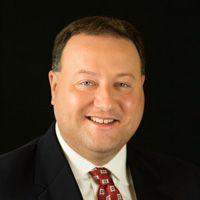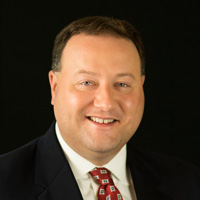Everybody's Missing the Biggest Story in Washington — Our Debt Nightmare
All signs are pointing to higher taxes in the future. The middle class, especially those diligently saving for retirement in their 401(k)s and IRAs, need to be ready for that.


Profit and prosper with the best of Kiplinger's advice on investing, taxes, retirement, personal finance and much more. Delivered daily. Enter your email in the box and click Sign Me Up.
You are now subscribed
Your newsletter sign-up was successful
Want to add more newsletters?

Delivered daily
Kiplinger Today
Profit and prosper with the best of Kiplinger's advice on investing, taxes, retirement, personal finance and much more delivered daily. Smart money moves start here.

Sent five days a week
Kiplinger A Step Ahead
Get practical help to make better financial decisions in your everyday life, from spending to savings on top deals.

Delivered daily
Kiplinger Closing Bell
Get today's biggest financial and investing headlines delivered to your inbox every day the U.S. stock market is open.

Sent twice a week
Kiplinger Adviser Intel
Financial pros across the country share best practices and fresh tactics to preserve and grow your wealth.

Delivered weekly
Kiplinger Tax Tips
Trim your federal and state tax bills with practical tax-planning and tax-cutting strategies.

Sent twice a week
Kiplinger Retirement Tips
Your twice-a-week guide to planning and enjoying a financially secure and richly rewarding retirement

Sent bimonthly.
Kiplinger Adviser Angle
Insights for advisers, wealth managers and other financial professionals.

Sent twice a week
Kiplinger Investing Weekly
Your twice-a-week roundup of promising stocks, funds, companies and industries you should consider, ones you should avoid, and why.

Sent weekly for six weeks
Kiplinger Invest for Retirement
Your step-by-step six-part series on how to invest for retirement, from devising a successful strategy to exactly which investments to choose.
There’s so much political news these days. I can’t turn on any news channel and not hear a constant drumbeat of Trump, Trump, Trump.
But he’s not the only story.
A lot of the noise coming out of Washington and the media really doesn’t matter. What does matter is the size of the mounting federal debt — over $22 trillion. And on top of that are the obligations to baby boomers for Social Security, Medicare and Medicaid – $60 trillion.
From just $107.88 $24.99 for Kiplinger Personal Finance
Become a smarter, better informed investor. Subscribe from just $107.88 $24.99, plus get up to 4 Special Issues

Sign up for Kiplinger’s Free Newsletters
Profit and prosper with the best of expert advice on investing, taxes, retirement, personal finance and more - straight to your e-mail.
Profit and prosper with the best of expert advice - straight to your e-mail.
Nobody seems to care about it, but it’s a mathematical nightmare for our country over the next generation. We are borrowing at an ever-increasing rate, and at some point, the lenders will say, “No more.” And when you look at the developed economies — the countries that have money — you’ll see that they’re all in bad shape, too.
So, what it comes down to is this: This problem isn’t something we can cost-cut our way out of. That’s because federal programs like Social Security and Medicare are unlikely to be meaningfully cut or reformed. There are just too many reliable voters in that group. Take Florida, for example. Donald Trump would not carry Florida in the next presidential election if he goes before the American people in 2020 and says, “I’ve got to cut Social Security.” Unfortunately, this potentially debilitating problem with our federal debt was created by politicians and never addressed.
Higher Taxes Could Help the Debt But Hurt Retirement Savers
There are only a couple of options to start bringing relief to the debt, and neither is appealing.
- No. 1, the Fed can print more money, but you can’t print that much money without massive economic dislocation. Look at what’s happened in Venezuela, for example.
- No. 2, we can raise taxes, and ultimately, that’s what’s likely to happen. Once the cuts put in place by the Tax Cuts and Jobs act expire at the end of 2025, you can almost bank on higher taxes happening.
It’s not unheard of for taxes to get extremely high when the situation is what our country is in right now. Keep in mind that the highest marginal income tax rates in U.S. history topped out at over 90% in the 1950s and ’60s, compared with 37% today. Some who were voted into the House of Representatives during last fall’s midterm elections have already talked about legislating astronomically high tax rates to deal with debt and social programs, and unfortunately, the math may demand that.
According to an analysis of IRS data by Pew Research, upper-income and middle-income people pay the lion’s share of federal taxes. In fact, those with adjusted gross incomes of $250,000 paid almost 52% of all income taxes, even though they represented fewer than 3% of the returns filed. Meanwhile, those in the bottom 20% got more money back from the government than they paid in taxes. So, it would seem clear that the way the government can raise money is by taxing the middle and upper-middle class.
The result likely will be that the middle and upper-middle class who saved in their IRAs and 401(k)s — and with taxable mandatory distributions coming at age 70½ — are likely to face taxes at a higher rate. From a retirement-planning standpoint, you might see a nice, round million-dollar figure in your 401(k) today, but how much of it 20 years from now will actually be yours, and how much will belong to Uncle Sam?
That’s the big story. I wish ABC, CNN, NBC and Fox News would stop talking about things that don’t matter and look at what will really matter to so many retiring Americans. What we really need to look at is the hard fact that we’re $22 trillion in the hole, and we’re adding to it at a rate of over $1 trillion a year.
Protecting Your Retirement from Taxes
Part of the solution, if you want to call it that, to our national debt problem might mean taking a bigger chunk of your retirement dollars — unless you take extra precautions. What investors should be doing is looking to position their money to protect it from potential tax implications.
The bottom line is that people need to stay on top of ever-changing laws. They need to realize that tax-favored accounts like Roth IRAs are not set in stone to be forever tax-free; laws can change.
In the Meantime, Let’s Watch What Happens
The solution the president tried to make happen with his tax bill was to try to grow the economy quickly. The U.S. spends a lot of money on those social programs, but if we’re pumping out 5% to 6% a year in economic growth, we can actually pay for it. We’ll see; the Federal Reserve is certainly heavily involved in the economy, and it plays a larger role in terms of monetary policies than, say, modest reductions in corporate taxes.
Meanwhile, we continue to just kick the can down the road — again. There has to be some type of limitation on government spending. You can’t have spending grow faster than the economy grows, or by nature you’re going to end up in a bad place.
Nobody seems to care. All they want to talk about in Washington is how they can spend more money. The financial consequences to future generations are unbelievable — higher taxes and a lower quality of life. But in some ways, these dire consequences aren’t surprising. The politician’s job, after all, isn’t to grow the economy. It’s to get elected.
Dan Dunkin contributed to this article.
Profit and prosper with the best of Kiplinger's advice on investing, taxes, retirement, personal finance and much more. Delivered daily. Enter your email in the box and click Sign Me Up.

Michael R. Andersen is the founder and president of Andersen Wealth Management, a Registered Investment Adviser. He is an Investment Adviser Representative and a licensed fiduciary. A firm believer in financial education, Andersen holds regular informational seminars for clients and the community, and he is the host of the "Wise Money" radio show.
-
 Betting on Super Bowl 2026? New IRS Tax Changes Could Cost You
Betting on Super Bowl 2026? New IRS Tax Changes Could Cost YouTaxable Income When Super Bowl LX hype fades, some fans may be surprised to learn that sports betting tax rules have shifted.
-
 How Much It Costs to Host a Super Bowl Party in 2026
How Much It Costs to Host a Super Bowl Party in 2026Hosting a Super Bowl party in 2026 could cost you. Here's a breakdown of food, drink and entertainment costs — plus ways to save.
-
 3 Reasons to Use a 5-Year CD As You Approach Retirement
3 Reasons to Use a 5-Year CD As You Approach RetirementA five-year CD can help you reach other milestones as you approach retirement.
-
 The 4 Estate Planning Documents Every High-Net-Worth Family Needs (Not Just a Will)
The 4 Estate Planning Documents Every High-Net-Worth Family Needs (Not Just a Will)The key to successful estate planning for HNW families isn't just drafting these four documents, but ensuring they're current and immediately accessible.
-
 Love and Legacy: What Couples Rarely Talk About (But Should)
Love and Legacy: What Couples Rarely Talk About (But Should)Couples who talk openly about finances, including estate planning, are more likely to head into retirement joyfully. How can you get the conversation going?
-
 How to Add a Pet Trust to Your Estate Plan: Don't Leave Your Best Friend to Chance
How to Add a Pet Trust to Your Estate Plan: Don't Leave Your Best Friend to ChanceAdding a pet trust to your estate plan can ensure your pets are properly looked after when you're no longer able to care for them. This is how to go about it.
-
 Want to Avoid Leaving Chaos in Your Wake? Don't Leave Behind an Outdated Estate Plan
Want to Avoid Leaving Chaos in Your Wake? Don't Leave Behind an Outdated Estate PlanAn outdated or incomplete estate plan could cause confusion for those handling your affairs at a difficult time. This guide highlights what to update and when.
-
 I'm a Financial Adviser: This Is Why I Became an Advocate for Fee-Only Financial Advice
I'm a Financial Adviser: This Is Why I Became an Advocate for Fee-Only Financial AdviceCan financial advisers who earn commissions on product sales give clients the best advice? For one professional, changing track was the clear choice.
-
 65 or Older? Cut Your Tax Bill Before the Clock Runs Out
65 or Older? Cut Your Tax Bill Before the Clock Runs OutThanks to the OBBBA, you may be able to trim your tax bill by as much as $14,000. But you'll need to act soon, as not all of the provisions are permanent.
-
 I'm a Financial Adviser: This Is the $300,000 Social Security Decision Many People Get Wrong
I'm a Financial Adviser: This Is the $300,000 Social Security Decision Many People Get WrongDeciding when to claim Social Security is a complex, high-stakes decision that shouldn't be based on fear or simple break-even math.
-
 4 Ways Washington Could Put Your Retirement at Risk (and How to Prepare)
4 Ways Washington Could Put Your Retirement at Risk (and How to Prepare)Legislative changes, such as shifting tax brackets or altering retirement account rules, could affect your nest egg, so it'd be prudent to prepare. Here's how.